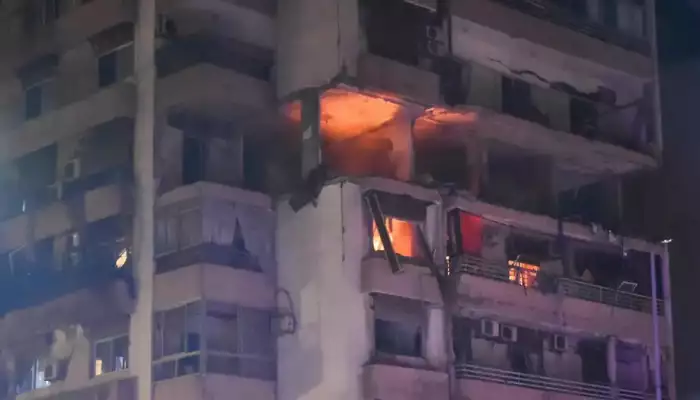
News agencies cited witnesses in reports that an Israeli airstrike hit an apartment building in central Beirut.
If confirmed this would be the first Israeli strike within the city limits of Beirut in almost a year of fighting between Israel and Hezbollah and comes amid continued attacks throughout Lebanon.
The Reuters news agency reported that an upper floor of an apartment building in the Kola district of Beirut was hit and cited witnesses as having heard a bang and seeing smoke rising from the upper floor of the building.
French news agency AFP cited a security source saying that an Israeli drone hit an apartment belonging to Islamist group Jamaa Islamiya and that four people were killed. This could not be independently verified.
There have been other strikes on Beirut, including the one that killed Hezbollah leader Hassan Nasrallah on Friday, but this would be the first within the city limits and not in a suburb.
Lebanon's Health Ministry on Sunday said that 105 people had been killed in Israeli strikes over a 24-hour period.
The ministry said that 359 people had also been injured as Israel struck parts of southern Lebanon including suburbs in Beirut.
The Israel Defense Forces (IDF) earlier said that it had conducted strikes on around 120 Hezbollah targets in southern Lebanon.
The IDF said that it was continuing attacks in Lebanon to "damage and degrade Hezbollah's military capabilities and infrastructure.
"Hezbollah 'much less efficient' than Israel realised: Middle East expert
Hanin Ghaddar, author and Senior Fellow from the Washington Institute's Arab Politics Program, told DW that two factors had influenced Israel's decision to escalate the conflict now in Lebanon.
"First is that the Israeli army is no longer needed in big numbers in Gaza. The military operation in Gaza is almost over and the rest that is needed doesn't require the majority of the Israeli army," Ghaddar explained.
Secondly Ghaddar said that Israel realizes that "it's very easy to infiltrate Hezbollah with their intelligence, that Hezbollah is much more deterred than they thought and much less efficient."
She said that the lack of efficiency means that Iran also does not want Hezbollah to respond.
On the question of how badly Hezbollah has been impacted by the attacks on its leadership, Ghaddar said that what had happened was essentially "an assassination of Hezbollah."
"What we see is not just an assassination of the leader of Hezbollah, Hassan Nasrallah, it's an actual assassination of Hezbollah itself by eliminating its founders," Ghaddar said.Palestinian group, the Popular Front for the Liberation of Palestine (PFLP) said on Monday that three of its members were killed in an Israeli strike in Beirut's Kola district.
The attack, which has yet to be confirmed by Israel, would be the first attack within Beirut's city limits since October 7.
Reuters news agency cited witnesses as saying that the strike hit the upper floor of an apartment building.
The PLFP said in a statement that its military security chief Mohammad Abdel-Aal, military commander Imad Odeh, and a third member, Abdelrahman Abdel-Aal were killed in the strike.
The PFLP is a secular left-wing group, aligned with Hezbollah in its support of the Palestinian group Hamas against Israel. The groups are all designated as terrorist organizations by various governments.
Over the past few days, Israel has been targeting Beirut's southern suburbs in strikes it says are aimed at degrading Hezbollah's military infrastructure.
Earlier strikes have focused largely on the Shiite majority areas where Hezbollah are dominant. The Kola district is traditionally more Sunni.